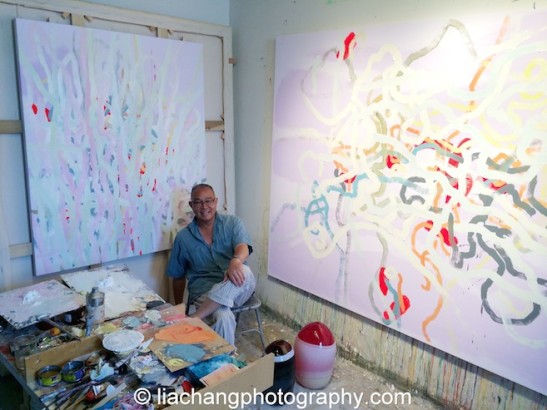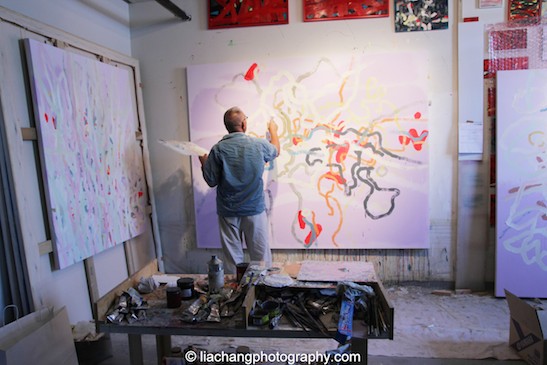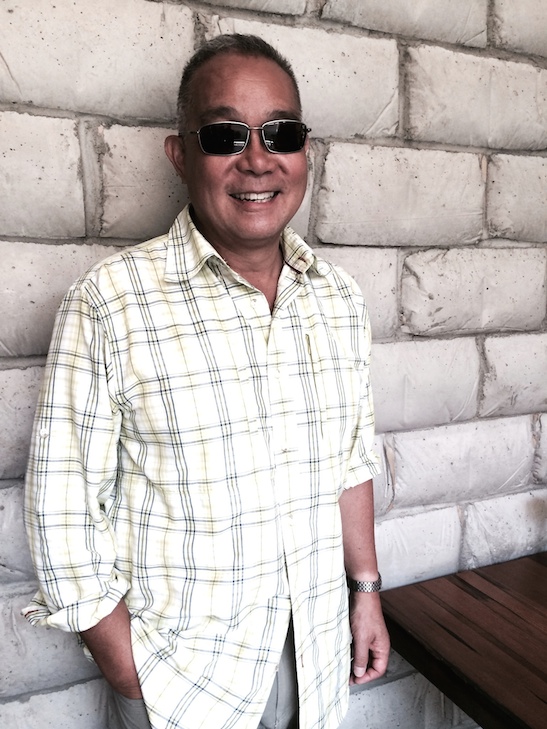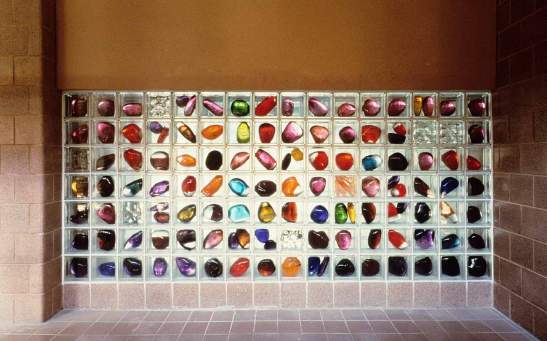by Lia Chang
AsAmNews Arts and Entertainment Reporter

Painter and glass sculptor Arlan Huang is busy learning Japanese before jetting off to Nagano, Japan, for AIR Zenkouji, his month long Artist-in-Residence in the grounds of Zenkoji Temple in September and for his latest show. Huang returns to Nagano after first exhibiting at Koji Moriya’s Flatfile Gallery, a 110 year old mud walled traditional Japanese house, in 2013.

On a balmy summer night in August, I met up with Huang and his wife, Lillian Ling for $1 oysters on the half shell at Crave Fishbar’s happy hour in Midtown Manhattan.

We noshed on griddled heritage pork belly with fresh cherries, chile sugar, cherry jus, steamed mussels, plancha grilled octopus with Chinese broccoli, cumin mustard vinaigrette, and handmade squid ink spaghetti with chopped shrimp, spring garlic, fresno chile, clam stock, while chatting about his Nagano residency, navigating Japan as an American artist, and his new exhibitions, Flowers of the Moon (9/8-9/18 in Osaka) and Pushing Hands (Nagano).

Lia: What kind of an exhibition did you have in 2013?
Arlan: We started working on the show in 2010. The opening was excellent. The show a success. The format allowed for small paintings only. I really never worked less than 72″x 60″. It was a challenge for me to go down to 11″x 14″. To my surprise it was no problem “being in the painting on a small scale”. In fact it was a revelation to work even smaller. I have continued to work small on plexiglass. The paintings have moved into a very sweet but muscular form. It has been a wonderful surprise to me. I love it.

Lia: How did this residency come about?
Arlan: Two years ago during my first show in Nagano, I was introduced to Mr Hitoshi Kimura, a professor of art at Shinshu University. Koji Moriya, owner of Flatfile indicated to me that Mr. Kimura had an Artist-in-Residency program and I would be welcomed to participate. I accepted for 2015. The official program is called, Artist-in-Residence in the grounds of Zenkoji Temple. I will be AIR from Sept 12 thru Oct 12, 2015. air-zenkouji.com

Lia: Why are you learning to speak Japanese?
Arlan: I’m attempting to learn a few sentences. When people come to New York, we expect them to speak some English. When you go to another country I would think they expect you to speak some of their language.

Lia: What will you be doing during your residency?
Arlan: I am getting a show together in Nagano. This is my AIR Zenkouji commitment to Nagano artists. The show will be different than a traditional group show where art is hung on the wall. This show is for artists to meet artists and to practice presenting your art and presenting yourself. Every artist comes with an artwork. You must carry it in your hand. The idea is your artwork is like your calling card. The show/ performance is all of us introducing ourselves to each other. You must limit your time so you can meet and practice with many artists. You must explain your art in six sentences. You must let whomever you are talking to hold your art. There is something very sexy about letting someone touch and feel your art. I love it. We speak in the language of your choice. I will get some help and try to memorize my art statement in Japanese. Hahaha. But I will try.
The reason I’m attempting my statement in Japanese is because Koji, one of my hosts, said it will be hard for some artists to speak in English. I responded by saying the art is the key. It is visual. We can explain in any language. But I will try doing my statement in Japanese. It is about sharing and practicing.
Lia: Where does “Pushing Hands” originate from?
Arlan: The name of the show will be “Pushing Hands” it refers to a taichi exercise. Two people pushing, pulling and fighting with their hands in a dance, sometimes touching, sometimes not. It is to practice and increase your skills.
Lia: What was it like to navigate as an American artist in Japan?
Arlan: At first, it was exhilarating being in a place where everyone looked like you. I can pass, for awhile. Beyond looks it became very apparent, I was American. Not Asian American, Chinese, or artist, but American. Identity becomes a new question. It took time to find my center but I did. It is a lesson in growth as a human being. Of course, as an artist from New York, I get a universal pass as being a little crazy with an eccentric life style.

Lia: What do you hope to accomplish during the four weeks that you are there?
Arlan: I will bring my oil paints and brushes. I plan on painting but I am open for new approaches to art. There are many Nagano artists doing different art. The excitement is in discovering and working with new artists in a totally different environment. Nagano City is on the edge of the mountains. The season will be transitioning into the Fall. What could be more inspiring?
Lia: Elaborate on the “crafts” nature of the art in Nagano.
Arlan: My former Squid Frames partner, Fumiko Hasegawa, informed me of the long history of craft in Nagano Prefecture. She said there is a very prestigious arts and crafts fair held every year. She aspired to be included in the fair before she moved to New York. She works in urushi, Japanese lacquer.

We were lucky to have attended the Summer Zenkoji Temple crafts fair. We were treated to some beautiful wood work from two local cabinet makers. They brought inventive items made from the cut offs. Koji said there was another wood artist who made amazing toys. And that was just the wood workers.
Huang’s paintings will also be on view in Flowers of the moon, at Eiko Kamiyama’s gallery Bi-Damas in Osaka, Japan, from Tuesday, September 8th through Friday, September 18th. Click here for more information.
Huang’s exhibition of his newest paintings, “Swimming Awkward Moment,” were recently on view at Trestle Gallery in Brooklyn in the Spring. The gallery is located in the same building as his 4000 sq. ft space in the Gowanus neighborhood of Brooklyn. For the past eight years, Huang has balanced his business, Squid Frame, with his passion for painting in Brooklyn. He spent 30 years in his previous Manhattan space on the Bowery. His painting studio occupies 900 sq. ft.

Huang describes his current practice as “looking at myself from the outside.” In 2014, Huang reacquainted himself with his entire body of work through a cataloging process facilitated by a Creating a Living Legacy award from the Joan Mitchell Foundation. This act of retracing allowed Huang to review his painting career through an experienced lens. Click here to learn more about his experience with the Joan Mitchell Foundation.

With Huang’s newest body of work he chooses to embrace awkwardness and paint with a layered perspective about his artistic decisions and the aspirations he held as a younger painter.
From this intensive look into his own history, Huang found that he has been “doing the same things over and over again,” with subtle shifts in color and line from one painting to the next. His search for a meditative “hum” while he paints is ever present as he experiments with the surface, color, and fluid movement of his abstract imagery. The results are layered and stacked linear marks, neat rows, or floating daubs of paint.

Arlan Huang (1948) was born in Bangor, Maine and was raised in San Francisco. Huang studied at San Francisco Art Institute (1964-65), City College of San Francisco (1966-69) and received his BFA from Pratt Institute (1972). Huang has permanent installations throughout New York, including the Museum of Chinese in Americas, Jacobi Medical Center, and Baron Capital, and has received awards from the Joan Mitchell Foundation, the National Endowment for the Arts, the New York City Board of Education, and the San Francisco Arts Commission. Recent solo exhibitions include Red for Yellow (2013), Flatfile Gallery, Japan; and Most Violet Paintings 2003-2008 (2008), Walter Randel Gallery, NYC. Huang has exhibited extensively in group exhibitions throughout the United States and abroad. He currently lives in Manhattan and works in Brooklyn, NY.

I first discovered Arlan Huang in 1994 at the Museum of the Chinese in the Americas in New York Chinatown. Entitled, “Dim Sum-Hearts Desire,” Huang’s mixed media installation was an approximation of his grandparents’ New York Chinatown tenement, with 100 numbered glass stones among the glass inventions representing a family history passed down from generation to generation.

168x96x72 inches (h x w x d)
installation by Arlan Huang. Photo courtesy of artasiaamerica.org
“100 stones for Grandfather,” shared Huang, “tells how my grandfather immigrated from Seattle to Vancouver to Alaska to Bangor and how he went back to China to get his wife and bring her back to Bangor. It is also the story of how migration happens and how they ended up on Mulberry St. There’s sort of a microcosm in Asian American history because of the immigration laws passed in the 1950’s where more immigrants could come to the U.S. My grandmother’s relatives immigrated to New York in the 1950’s and my grandparents came to help them get settled.”
In 1996, Huang created a glass wall installation entitled, “American Origins” at P.S. 152 in Brooklyn for the New York City Board of Education, in the hope of contributing to the ideas of American public education. The focal point for this installation is the immigrant experience and the collective hope of coming to America to educate children in the best education system possible.

Fabricated of glass stones encased in glass blocks, there are 247 transparent, translucent and opaque colored stones numbered from 152-399. The block between 282 and 283 in the red wall is the only block not numbered. It contains the shards of a word sculpture by the artist John Brekke.

56 x 128 inches
site specific installation
“American Origins, located in P.S. 152, Brooklyn. Photo courtesy of artasiaamerica.org

Untitled, 2010
Glass Photo by: Bruce Damonte
Huang has designed public works of art for the National Endowment for the Arts and has created permanent glass sculptures for the New York City Percent for the Arts Program and the New York Dormitory Authority. For Urban Glass, he created “Aquellos Ojos Verdes for Olga,” a steel and wood framed blown glass in glass block partition. For Baron Capital, a New York brokerage firm, he worked with Genseler and Associates on an undulating glass block wall.

Jacobi Medical Center
His commissions include a glass and steel commission for Laguna Honda Hospital for the San Francisco Arts Commission; an installation for the Borough of Manhattan Community College; and the river stone shaped glass pieces for his sculptural installation for the lobby of the new $173 million, 400,000 square foot Jacobi Medical Center in the Bronx, commissioned by the Percentage for Art in NYC Program. The design is Huang’s homage to a Zen rock garden and reflecting pool which hangs 20 feet above the main staircase and escalators of the building, residing within the interior skylight space. The 50 blown glass pieces seem connected by umbilical cords of fiber optic cable.
Huang has returned to his first love painting and has been enjoying the luxury of moving oil paint and being “in” the painting in solitude. He considers this medium to be a counter point to his glass blowing activities which are a social, team-oriented process.
To contact Arlan Huang regarding his glass vessels and paintings, you can email him at [email protected].

Lia Chang is an award-winning filmmaker, a Best Actress nominee, a photographer, and an award-winning multi-platform journalist. Lia has appeared in the films Wolf, New Jack City, A Kiss Before Dying, King of New York, Big Trouble in Little China, The Last Dragon, Taxman and Hide and Seek. She is profiled in Jade Magazine.

